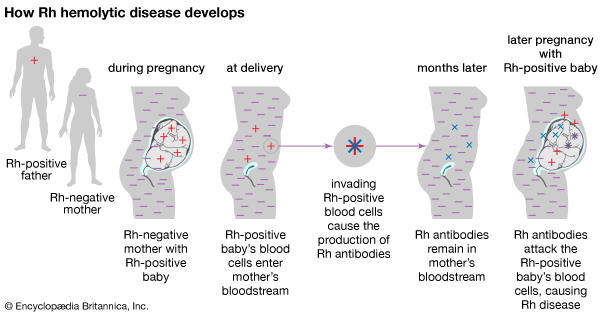
adjective
- See under Rh factor.
noun Physiology.
- any of a type of specific antigen present on the surface of red blood cells, persons having inherited such antigens being designated Rh+ (Rh positive) and persons lacking them, a much smaller group, being designated Rh− (Rh negative): blood of Rh− persons is incompatible with Rh+ blood because of antibody reaction, and an Rh− woman who bears an Rh+ baby will have formed antibodies to the fetal blood that, unless removed from her bloodstream by apheresis in a subsequent pregnancy, will be carried across the placenta and destroy red blood cells of the next Rh+ fetus, resulting in erythroblastosis in the newborn.
noun
- blood containing the Rh factor
- a person having such blood
noun
- an agglutinogen commonly found in human blood: it may cause a haemolytic reaction, esp during pregnancy or following transfusion of blood that does not contain this agglutinogenFull name: rhesus factor See also Rh positive, Rh negative
1942, from the first letters of rhesus; so called because the blood group, and its effects, were discovered in the blood of rhesus monkeys (1941).
n.
- Any of several substances on the surface of red blood cells that induce a strong antigenic response in individuals lacking the substance.
- Any of several antigens present on the surface of red blood cells in most humans. People with Rh factors are classified as having a blood type that is Rh positive, while people who lack the antigen are said to be Rh negative and can produce powerful antibodies that destroy red blood cells if given a blood transfusion from an Rh-positive donor. A woman who is Rh negative and is pregnant with an Rh-positive fetus can produce antibodies that are life threatening to the fetus. See Note at blood type.
Any of several substances found on the surface of red blood cells in persons.
 Liberal Dictionary English Dictionary
Liberal Dictionary English Dictionary